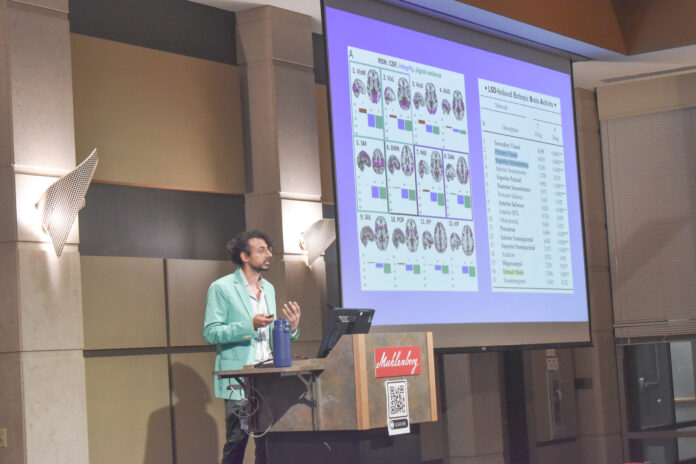Every year, the sophomore class of the Shankweiler Scholars Medical Humanities program, led by Jacquline Antonovich, Ph.D., and Gretchen Gotthard, Ph.D., invites a speaker to campus. This year, the program invited Manoj Doss, Ph.D., a renowned psychedelics researcher, to present his findings on the effects of psychedelics on the brain. His talk titled “A Critical Perspective on the Acute and Enduring Effects of Psychedelics on Brain Function and Cognition” aimed to shed light on the little-known aspects of the brain that are affected by psychedelics.
Doss is on the cutting edge of psychedelic research in the nation. He completed a Ph.D. at the University of Chicago broadly researching distortions in episodic memory with a focus on the effects of psychoactive drugs such as MDMA, THC and alcohol on emotional episodic memory. Currently a postdoctoral fellow at the Johns Hopkins Center for Psychedelic & Consciousness Research, Doss is interested in the cognitive, emotional and neural mechanisms of psychedelic drugs.
As Doss took to the stage, the audience was eagerly awaiting the insights he had to share. However, it quickly became apparent that the talk would be highly technical and complex. Doss, a veteran researcher with several publications to his name, spared no details and delved right into the details of his work.
He first began deconstructing some commonly held misconceptions about the effects of psychedelics on the human brain, even within the scientific community. It was believed that psychedelic drugs caused reductions in the area of the brain called the Default Mode Network (DMN). The DMN is active when the individual is not engaged with their external environment, so thinking about others, thinking about themselves, remembering the past and planning for the future are all functions of the DMN.
This gave those who believe psychedelic drugs are harmful to humans some scientific authority that affirmed their thoughts. But, Doss showed that by following the scientific process, this hypothesis was largely disproved. “Biases creep into scientific analysis of psychedelic drugs on the brain,” said Doss, as he explained that, in reality, these drugs mainly affect the sensory parts of the brain.
Doss also addressed the concept of “microdosing.” A practice within the community of those who use psychedelics, microdosing is where a person takes a very small amount (around .3 grams) of psychoactive drugs, typically psilocybin mushrooms, to experience an elevated state of mind to increase mood and productivity. Despite having a cult following, microdosing is “not that more effective than a cup of coffee,” according to Doss. He explained that at very low doses, psychedelics can have parallel effects to common stimulant drugs, like caffeine. The drawbacks of microdosing are also similar to those of stimulant drugs, such as feelings of anxiety, cardiac and breathing issues and a lack of long term improvements of mood and focus. So, despite what people tripping on psychedelics might claim, Doss confirmed that they do not lead to any increase in cognitive ability.
The main focus of the talk was to highlight the potential of psychedelics to improve a very specific type of memory called episodic memory. Episodic memory is a past-oriented memory system that allows re-experiencing previous events, and the data shows that forms of psychedelic drugs can greatly enhance it. Studies done by Doss and his research team produced results in which there were increases in activity in the areas of the brain responsible for episodic memory in those who had consumed LSD and even THC. Unfortunately, they won’t bump up your test scores, as the memory systems used for information are very different from episodic memory. But they do not seem to cause much of a decrease either, with Doss explaining, “If you study high on cannabis the day before a test, you won’t do very well on the test. If you study sober and take the test high, you might be a little slower, but there won’t be much of a difference in your memory.”
When asked what he wanted the average person to know about psychedelic drugs, Doss wanted to reiterate that psychedelics can play an extremely positive role in clinical settings, predicting that “MDMA will be used as a tool to treat [post traumatic stress disorder] PTSD by 2025.” He drove home that—through further research and greater understanding of these drugs—we can deconstruct our biases and use psychedelics as an essential tool in many different disciplines.
As the audience exited Miller Forum, they were left with a newfound appreciation for the complexities of the brain and the role that psychedelics can have on the brain. And while they may not have understood all of the technical language used by Doss, they were grateful for the opportunity to learn from a leading expert in the field. “Even though I couldn’t follow all of the specifics, it’s so clear that the speaker is very passionate and that made me feel very engaged and have some ‘woah’ moments” said Serena Hertzog’23.






















